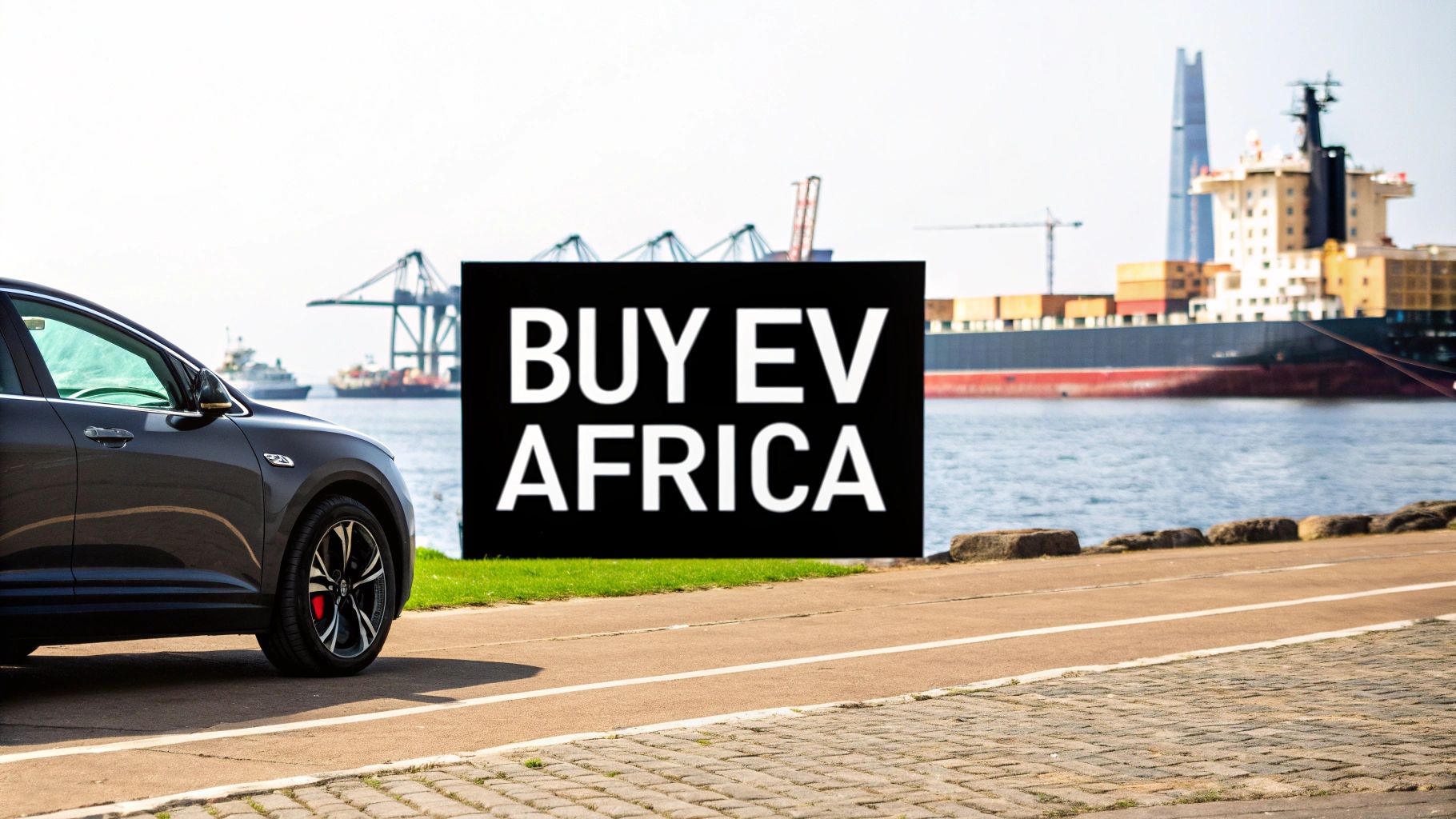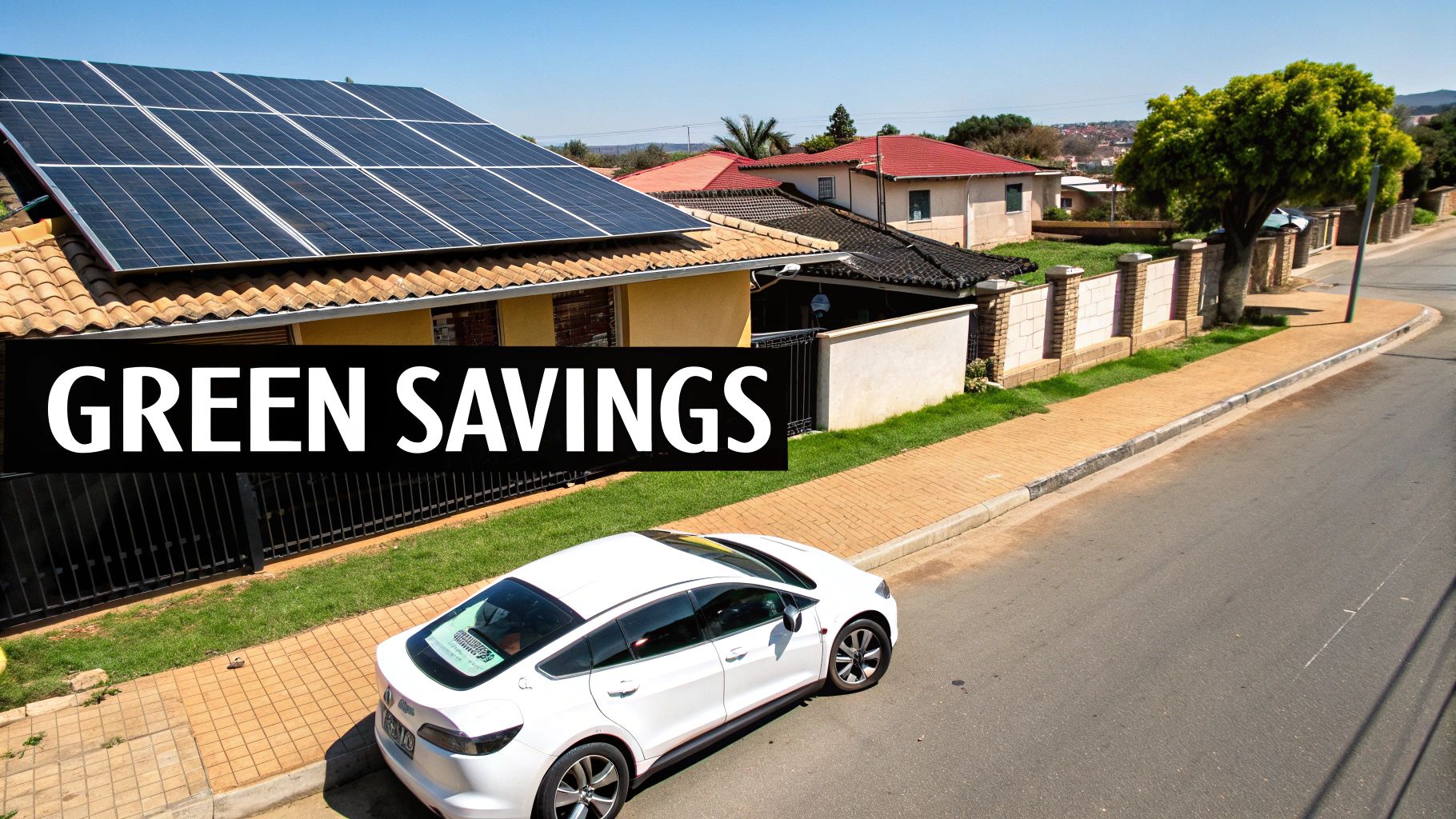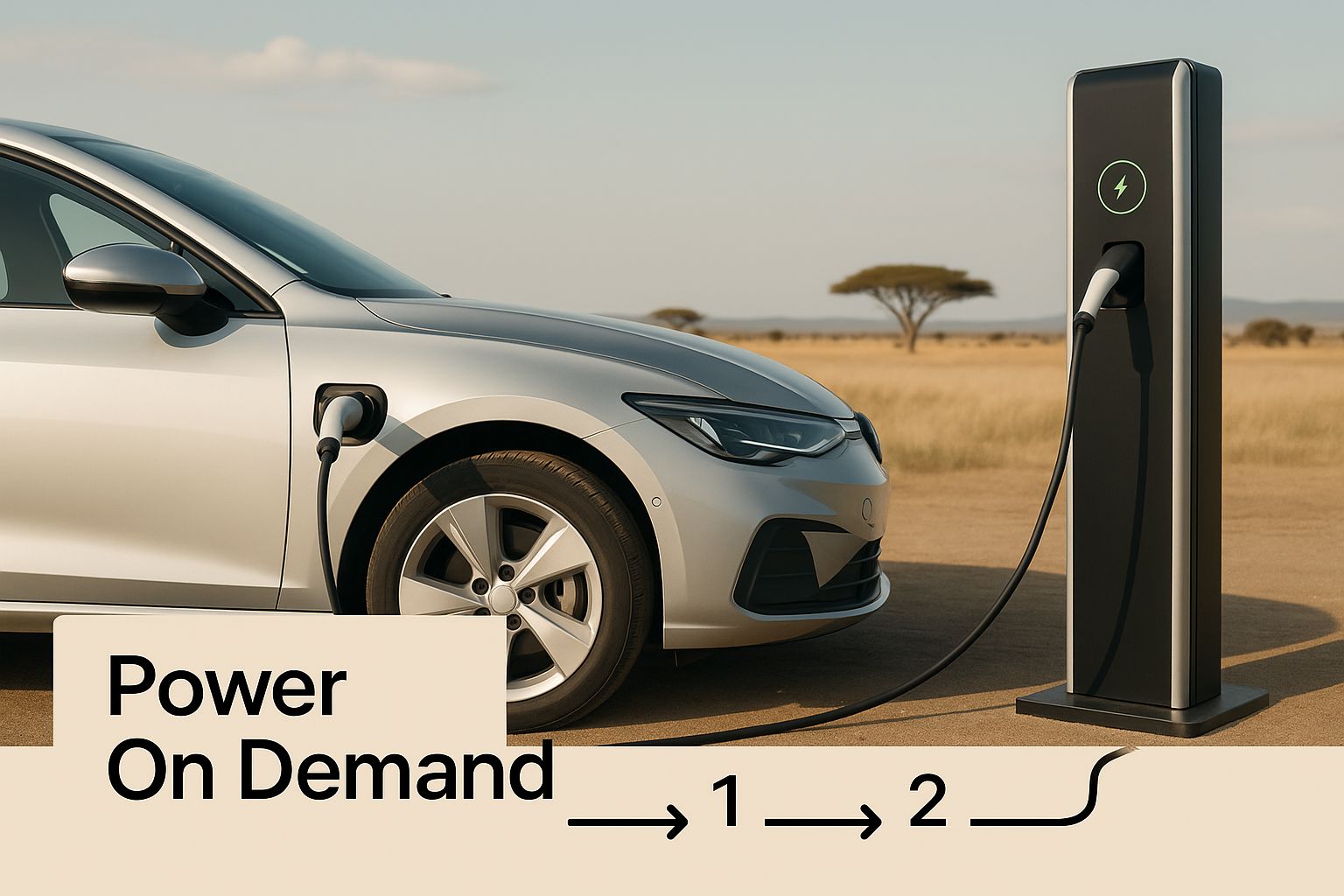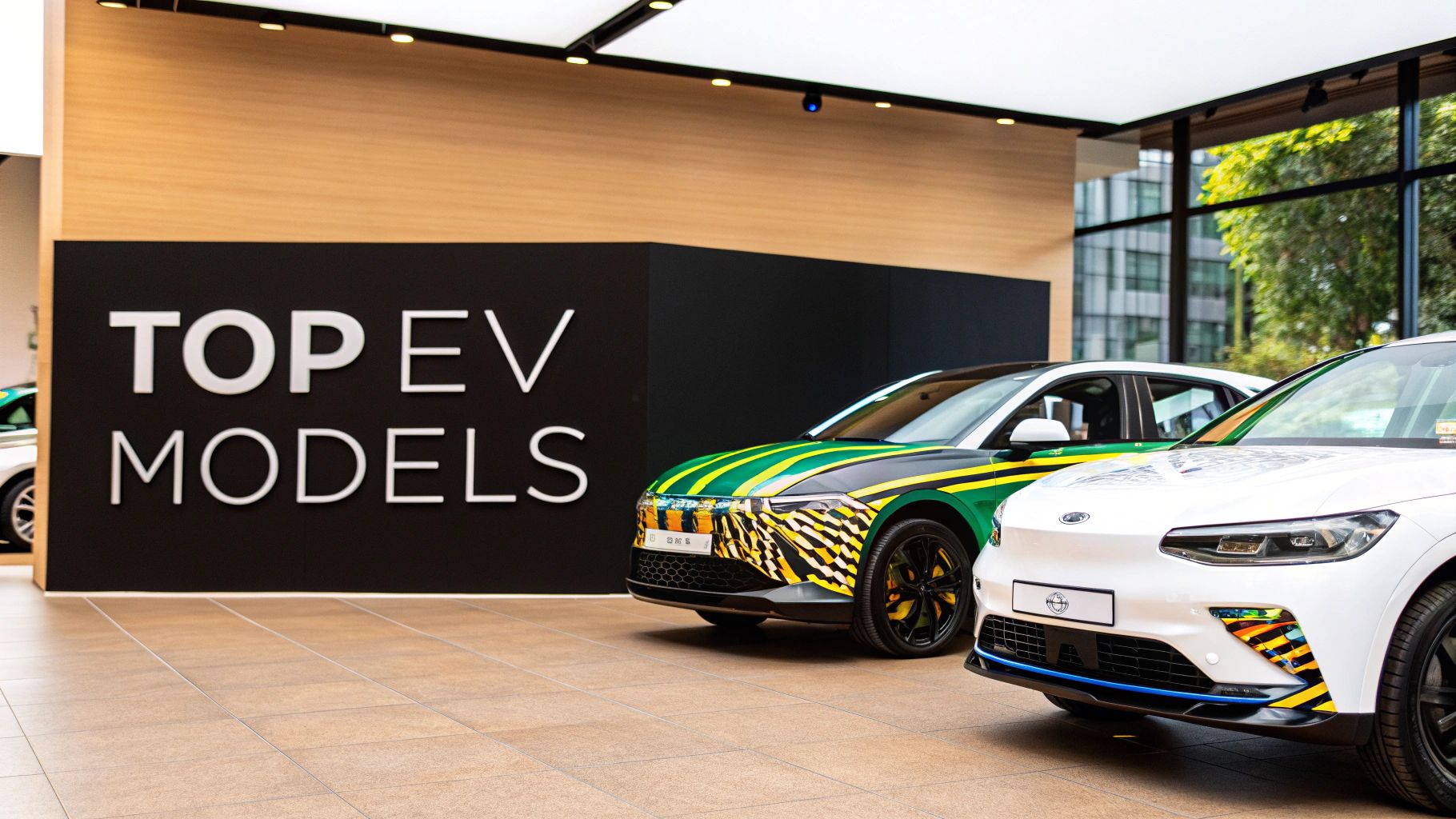
Thinking about how to buy an electric car in Africa? You might be surprised to learn it’s more straightforward than you think, especially with services that handle the heavy lifting of importation for you. This isn’t some far-off futuristic idea; it's a smart, practical decision being made right now, thanks to unpredictable fuel costs and new government incentives.
The Electric Shift is Already Happening in Africa
Let’s get real about why you’re seeing more EVs on African roads. This isn't just a fleeting trend. It's a genuine shift driven by things that affect our daily lives, like the ever-increasing price of petrol. When you're dealing with volatile fuel costs, the idea of low, predictable running costs for an EV starts to look very appealing.
At the same time, people living in our busy cities—from Nairobi and Lagos to Kigali—are looking for ways to breathe cleaner air. This push for better urban living, combined with simple economics, is creating the perfect environment for the electric car market to really take off.
How Policy is Paving the Way
Smart government policies are really adding fuel to the fire—in a good way. We're seeing more and more countries actively encouraging people to go electric by making it easier on the wallet. Take Rwanda, for example. They’ve slashed import duties on electric vehicles, which directly cuts down the upfront cost for buyers.
And it's working. Rwanda’s EV numbers jumped from a mere 19 cars in 2020 to around 515 by early 2024. That’s a massive 25-fold increase in just four years, showing just how much demand there is when the price is right. It’s a clear signal that people are ready to make the switch.
For most people, the first step is figuring out how to get the car here in the first place. That’s where specialised services like EV24.africa come in, designed to turn what seems like a complicated import process into a clear, manageable journey.
This growth is part of a much bigger picture. To get a better sense of the global efforts and momentum behind this movement, it’s worth reading up on resources about Empowering Electric Vehicles.
Getting Past the Old Obstacles
Of course, it's not all smooth sailing. The initial cost and the state of public charging infrastructure are still valid concerns for many. But things are changing, and they're changing fast.
Battery technology gets better and cheaper every year, which is steadily bringing down the sticker price. Plus, most early EV owners are discovering that charging at home overnight covers almost all of their daily driving needs. It’s this change in mindset, paired with the undeniable benefits, that makes now such an interesting time to consider going electric in Africa.
Finding the Right EV for African Driving Conditions

Choosing your first electric car is exciting, but it’s crucial to look past the shiny features and think about what really works for driving on African roads. The perfect EV for a driver in Europe isn't necessarily the best fit here. It’s all about matching the car’s capabilities to your daily life and our local environment.
So, where do you begin? Start with an honest look at your routine. How far is your daily commute? Are you mostly zipping around the city, or do you take longer trips between towns on the weekend? Think about your family size, the state of the roads you drive on most, and what you'll be using the car for day-in and day-out. Nailing this down first is the key to making a smart choice.
Key Factors to Consider
With a clear picture of your needs, you can start digging into the specs of different EVs. Don't get distracted by the marketing noise. Your focus should be on the practical details that will shape your experience when you buy an electric car in Africa.
There are three big things to keep a close eye on:
- Real-World Battery Range: The range you see in an advertisement is almost always based on perfect, ideal conditions. You need to look for real-world estimates, which consider our climate and different driving styles. A car with a solid 300 km real-world range is plenty for most daily driving, but you'll want more for stress-free intercity travel.
- Charging Compatibility: Let's be realistic, most of your charging will happen at home, probably overnight, plugged into a regular wall socket. But you still need to know the car's charging speed and what kind of connector it uses for those times you need a quick top-up at a public station.
- Local Service and Spares: EVs are famous for needing less maintenance, but when they do, you need access to technicians who know what they're doing. Choosing a model with some local support, like the ones curated by EV24.africa, gives you that crucial peace of mind.
Here’s a pro tip: The goal isn't to buy the EV with the biggest battery. It's to get the one with the right-sized battery for your actual life. A lot of first-time buyers make the mistake of overpaying for range they will never use.
Comparing Popular EV Models for African Roads
To put this all into perspective, let's look at a few popular electric cars you can find on the EV24.africa marketplace. This quick comparison shows how different models are better suited for different drivers across the continent.
Comparing Popular EV Models for African Roads
| EV Model | Estimated Range (km) | Best Use Case | Charging Time (Standard AC) |
|---|---|---|---|
| Volkswagen ID.4 | 400-500 | Family SUV, long-distance travel, varied terrain | 7-8 hours |
| BYD Dolphin | 300-400 | City commuting, small families, efficiency | 6-7 hours |
| Tesla Model 3 | 450-550 | Performance, technology enthusiasts, highway driving | 8-9 hours |
| Compact City EV | 150-250 | Daily errands, navigating dense urban traffic | 5-6 hours |
As you can see from the table, a compact city EV is a brilliant and affordable choice for someone navigating Kigali's streets every day. But for a family in Nairobi that loves weekend road trips, the extra space and range of something like the VW ID.4 just makes more sense.
Ultimately, your own lifestyle is the most important guide you have when you decide to buy an electric car in Africa.
Getting Your EV From Showroom to Driveway
So, you've picked out your perfect electric car. Now, how does it get from a dealership halfway across the world to your home in Africa? It might seem like a daunting journey, but with an experienced hand guiding the process, it's actually quite straightforward. It all starts long before the car is loaded onto a ship.
The first crucial step is a thorough pre-shipment inspection. We’re not talking about a quick glance under the bonnet. This is a comprehensive evaluation of the vehicle's condition, its specifications, and most importantly, its battery health. This ensures the car you paid for is the car that gets shipped, with no nasty surprises waiting for you on arrival. It’s all about giving you total peace of mind right from the get-go.
This journey, from showroom to savannah, is a well-oiled machine when managed correctly.

As you can see, a coordinated logistics chain is what makes getting an EV to your door a reliable reality.
Finding the Right Shipping Method for You
With the inspection complete, we need to decide on the best way to get your EV across the ocean. There are two main methods, and the one you choose will likely come down to your budget, the value of your car, and how much protection you want.
- Roll-on/Roll-off (RoRo): Think of this as a massive, floating car park. Your EV is simply driven onto the vessel and secured for the trip. It’s the most cost-effective way to ship a standard vehicle. The trade-off? It’s more exposed to the elements during the journey.
- Container Shipping: This is the premium option. Your car is loaded into its own sealed steel container, protecting it from weather, knocks, and prying eyes. For high-value EVs or for anyone wanting maximum security, this is the way to go.
A specialist like EV24.africa can walk you through the pros and cons for your specific car, helping you strike the right balance between cost and safety. Getting this expert advice is a massive benefit when you decide to buy an electric car in Africa via importation.
Here's a pro tip many first-time importers miss: get comprehensive marine insurance. Standard liability from the shipping line is minimal and won't cover much. A proper policy protects your investment against damage or even total loss during its long voyage. It's a non-negotiable part of the process.
From the Port to Your Pavement
The journey isn't over once the ship docks at a port like Mombasa or Dar es Salaam. Depending on where the car is coming from, the ocean transit alone can take several weeks.
Budgeting for these logistics is key. You can get a rough idea of the costs involved by using a shipping cost predictor to help with your financial planning.
Once the ship arrives, your car needs to be carefully unloaded and guided through customs. This is where having an experienced team on the ground is absolutely vital. They handle all the port-side admin, ensure your EV is treated with care, and manage the handover for its final journey inland to you. This expert oversight is what prevents frustrating delays and makes the whole process feel seamless.
Getting to Grips with Local Customs Duties and Taxes
Navigating customs is often the final, and most confusing, hurdle when you decide to buy an electric car in Africa. It’s the part of the process where the final price gets locked in, and honestly, it can feel like a maze of unfamiliar fees and paperwork.
The total cost you’ll pay at the port is a mix of the car's value plus several government levies. For a standard petrol car, these import duties, excise taxes, and Value Added Tax (VAT) can be brutal, sometimes adding 50% or more to the car’s original price tag.
But here’s where the story for electric vehicles takes a much more exciting turn.
The Game-Changing Power of EV Tax Incentives
Governments across Africa are catching on to the huge economic and environmental wins that come with electric mobility. To speed things up, many are offering serious tax incentives to encourage people to make the switch. These aren't just small discounts; we're talking about massive exemptions that can dramatically slash the final price of an imported EV.
Rwanda is a brilliant example of this forward-thinking approach. The government has put a policy in place that completely exempts electric vehicles from import duties, excise taxes, and VAT. It's a bold move, part of a bigger plan to build a sustainable transport system and a local green economy. You can read more about Rwanda's EV market development on mobilityforesights.com.
What this means for you is simple: when you import an EV into Rwanda, the price you pay is incredibly close to the actual cost of the car and shipping. It’s a world away from the heavy taxes you'd face with a petrol equivalent.
The key thing to remember is this: these government incentives aren’t a minor perk. They are the single biggest factor making EVs a genuinely affordable option for more people across the continent. When you buy an electric car in Africa, these tax breaks can be the difference between a dream car and a car you can actually own.
A Real-World Cost Breakdown
Let's put some real numbers to this. Say you’re importing a Volkswagen ID.4 with a value of $30,000. We'll look at how the final cost stacks up in a country with standard duties versus a country with full EV exemptions, like Rwanda.
Cost without EV Incentives (A typical scenario):
- Vehicle Cost: $30,000
- Typical Import Duty (e.g., 25%): +$7,500
- Typical Excise Tax (e.g., 20%): +$6,000
- Typical VAT (e.g., 18%): +$5,400
- Estimated Final Cost: Around $48,900
Cost with Rwandan EV Incentives:
- Vehicle Cost: $30,000
- Import Duty: $0 (Exempt)
- Excise Tax: $0 (Exempt)
- VAT: $0 (Exempt)
- Estimated Final Cost: Around $30,000
As you can see, this isn't pocket change. You're looking at a potential saving of nearly $19,000 on a single vehicle, all thanks to smart government policy. The tax rules completely flip the financial script. To see how policies differ from one country to another, check out our detailed EV import duties comparison for African countries.
This is exactly where a service like ours at EV24.africa really shows its value. Our team handles all the customs paperwork, works directly with the clearance agents, and makes sure every single tax exemption you’re entitled to is properly applied. We turn a potential bureaucratic nightmare into a smooth, transparent final step, so you can be confident you’re getting the best possible price.
Securing Financing for Your EV Purchase

Alright, let's talk about the money. You’ve picked out your perfect EV and you know the import process inside and out. The last piece of the puzzle is figuring out how to pay for it. The great news is that financing an electric car is getting easier all the time as the market grows and banks start paying attention.
In the past, getting a car loan in many parts of Africa, especially for an import, could feel like an uphill battle. That’s changing. We at EV24.africa are actively building partnerships with local banks to create loan products specifically for people looking to buy an electric car in Africa.
Preparing for Your Loan Application
To give yourself the best shot at a quick approval, it pays to get your financial house in order before you even talk to a lender. Banks need to see that you're a safe bet and can comfortably handle the repayments.
Start by getting your documents together. The exact list can change from one bank to another, but you’ll almost definitely need these basics:
- Proof of Income: This could be recent payslips, a letter from your employer, or your business's financial statements.
- Identification: Have your national ID, passport, and any other personal documents ready to go.
- Bank Statements: Most banks ask for the last three to six months to see your cash flow.
- Vehicle Quotation: You'll need the official pro-forma invoice from us at EV24.africa, which details the car’s price.
Here's a pro tip: Always ask about "green financing" options. Some progressive banks are now offering better interest rates or more flexible terms for eco-friendly purchases like EVs. It’s definitely worth asking your bank if they have any special green loans.
Finalising the Purchase
Once your financing gets the green light, you're in the home stretch. The last few steps usually involve signing the loan agreement and paying your deposit. This down payment typically goes straight to the seller to lock in your car and get the shipping process started.
After all the logistics and customs are handled, the best part finally arrives. You get the keys, the official ownership documents (like the logbook), and all the paperwork needed to register the car in your name. For a more detailed look at your options, check out our guide on the 5 ways to finance your electric vehicle purchase in Africa. This is where all your research pays off, and you can finally get behind the wheel.
Common Questions on Buying an EV in Africa
Even with all the benefits clear, it’s completely normal to have some questions rattling around before you take the plunge and buy an electric car in Africa. I hear a lot of the same concerns from new buyers: what about charging, who will fix it, and are those tax breaks actually real? Let’s tackle these head-on.
One of the biggest anxieties is always charging. "What happens if there are no public chargers near me?" The truth is, for most EV owners on the continent, that’s not really a problem. The vast majority of charging simply happens at home.
Pretty much any electric car can be plugged into a standard wall socket overnight with the right adaptor. This slow-and-steady approach easily covers the average daily commute. If you need a faster top-up, installing a dedicated Level 2 wall box charger at home or your office is a great, and increasingly affordable, upgrade.
What About Maintenance and Repairs?
Another smart question is about what happens when your imported EV needs a service or a repair. It's a valid concern, but the landscape is changing for the better, and quickly.
The network of technicians who actually know their way around an EV is growing, particularly in major cities. My advice? Stick with a more common model, like the ones we offer at EV24.africa. Doing so makes finding spare parts much less of a headache. Don’t forget, EVs have far fewer moving parts than a petrol car, which means less routine maintenance in the first place.
The crucial thing to remember is after-sales support. Having a reliable partner who can point you to trusted workshops and help source parts turns a potential nightmare into a simple task.
Are the Tax Incentives Really That Good?
Okay, let's talk about the money. Are the tax savings on imported EVs as good as they sound? In a word: yes. They are a massive deal.
In forward-thinking countries like Rwanda, government policies are designed to make EVs incredibly attractive. These incentives often mean total exemption from import duties, excise taxes, and VAT. This can slash the final price of the car by more than half compared to a petrol vehicle of similar value.
This isn't a minor discount we're talking about; it’s a huge financial lever that makes switching to electric a genuinely smart financial decision. For a full breakdown, you can learn everything you need to know before buying an electric vehicle in Africa in our detailed guide. When you add up the tax savings and the lower running costs, the long-term value is undeniable.
Ready to see what’s out there? Head over to EV24.africa today to browse our hand-picked selection and begin your journey towards a cleaner, cheaper way of driving. https://ev24.africa
Article created using Outrank




